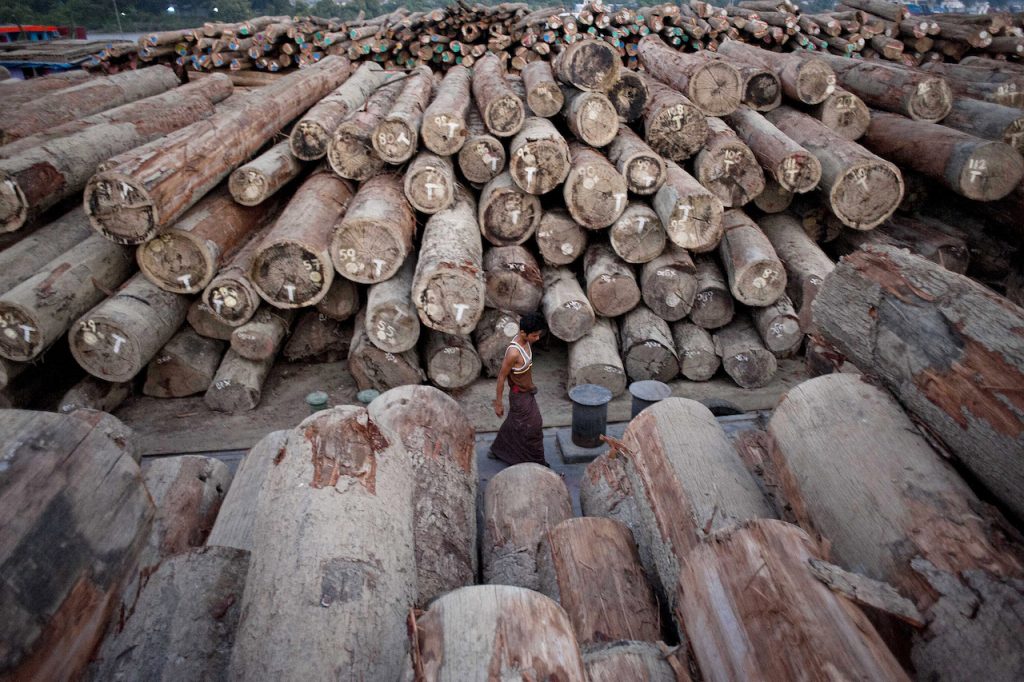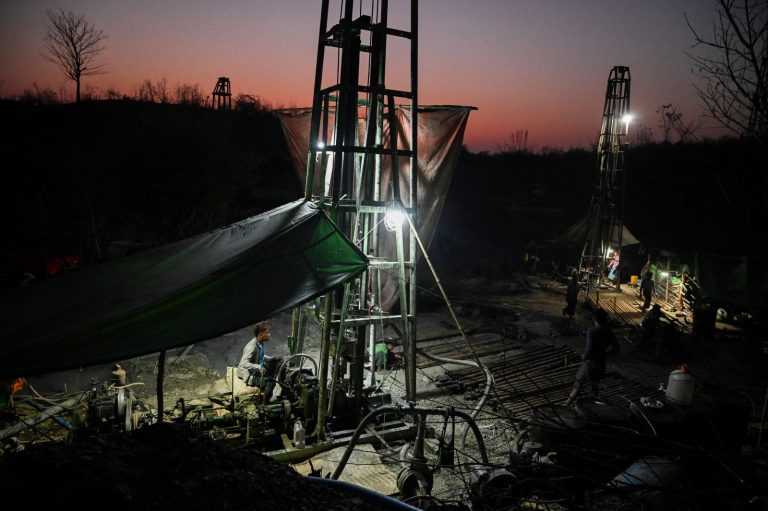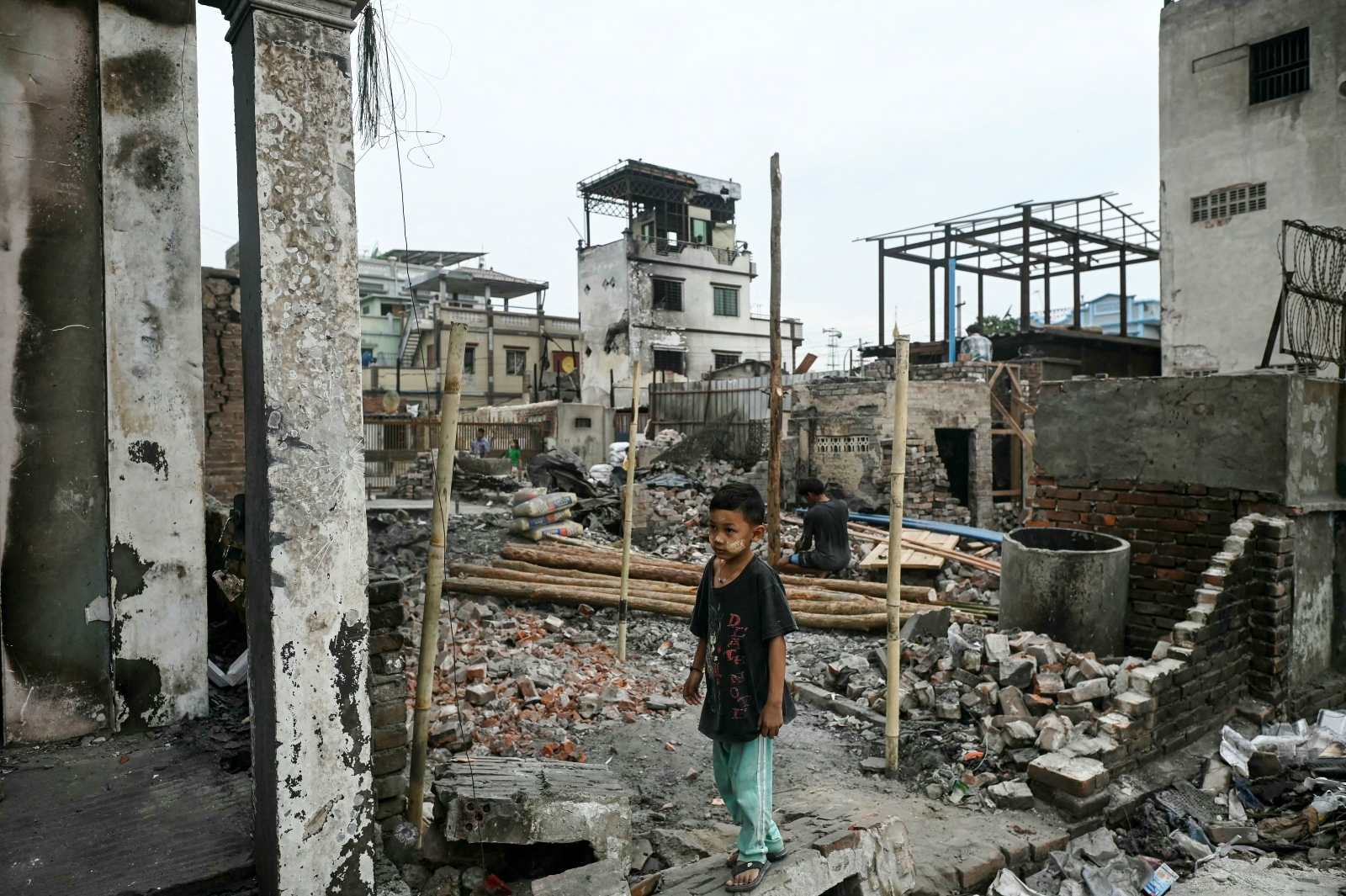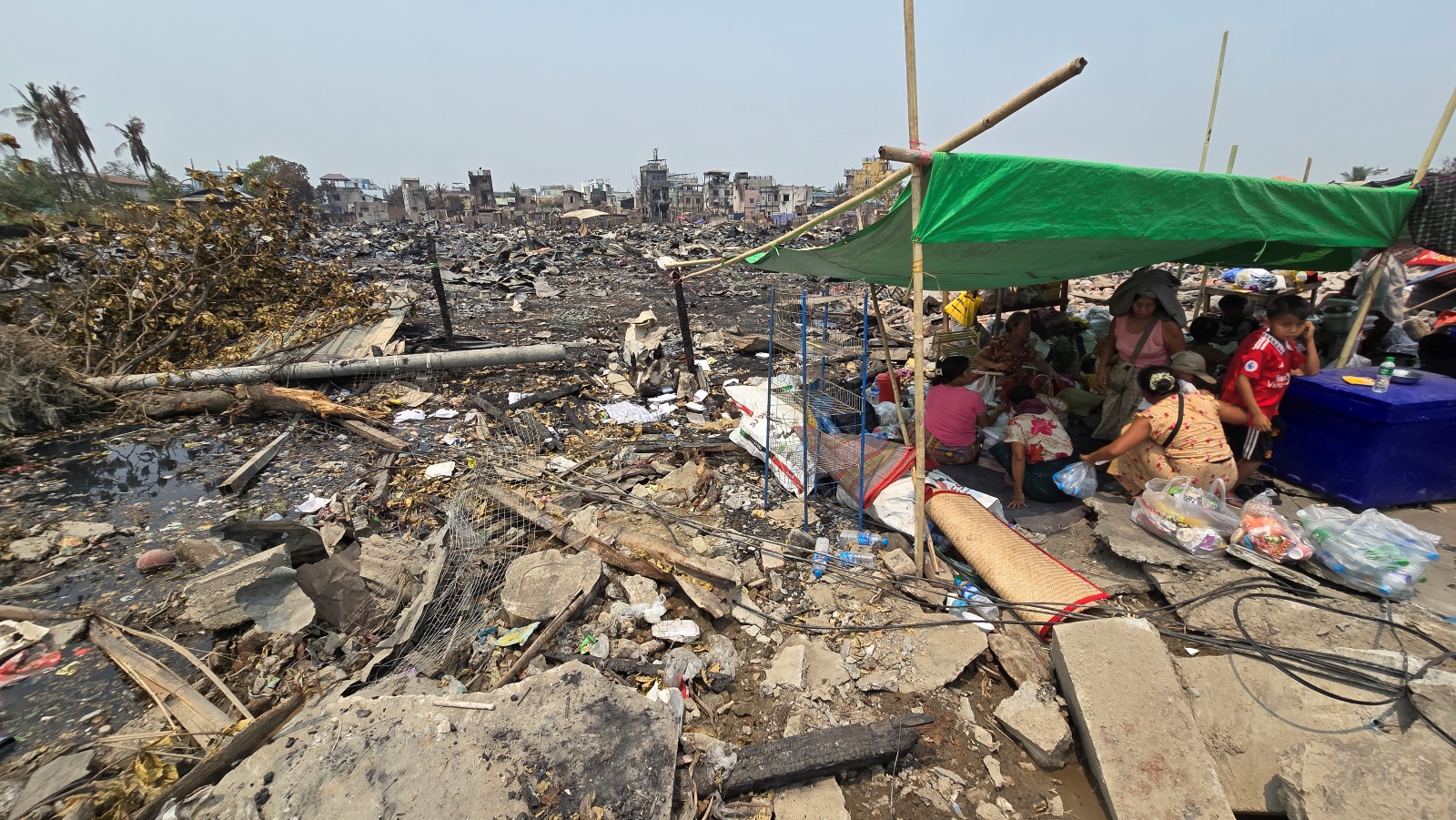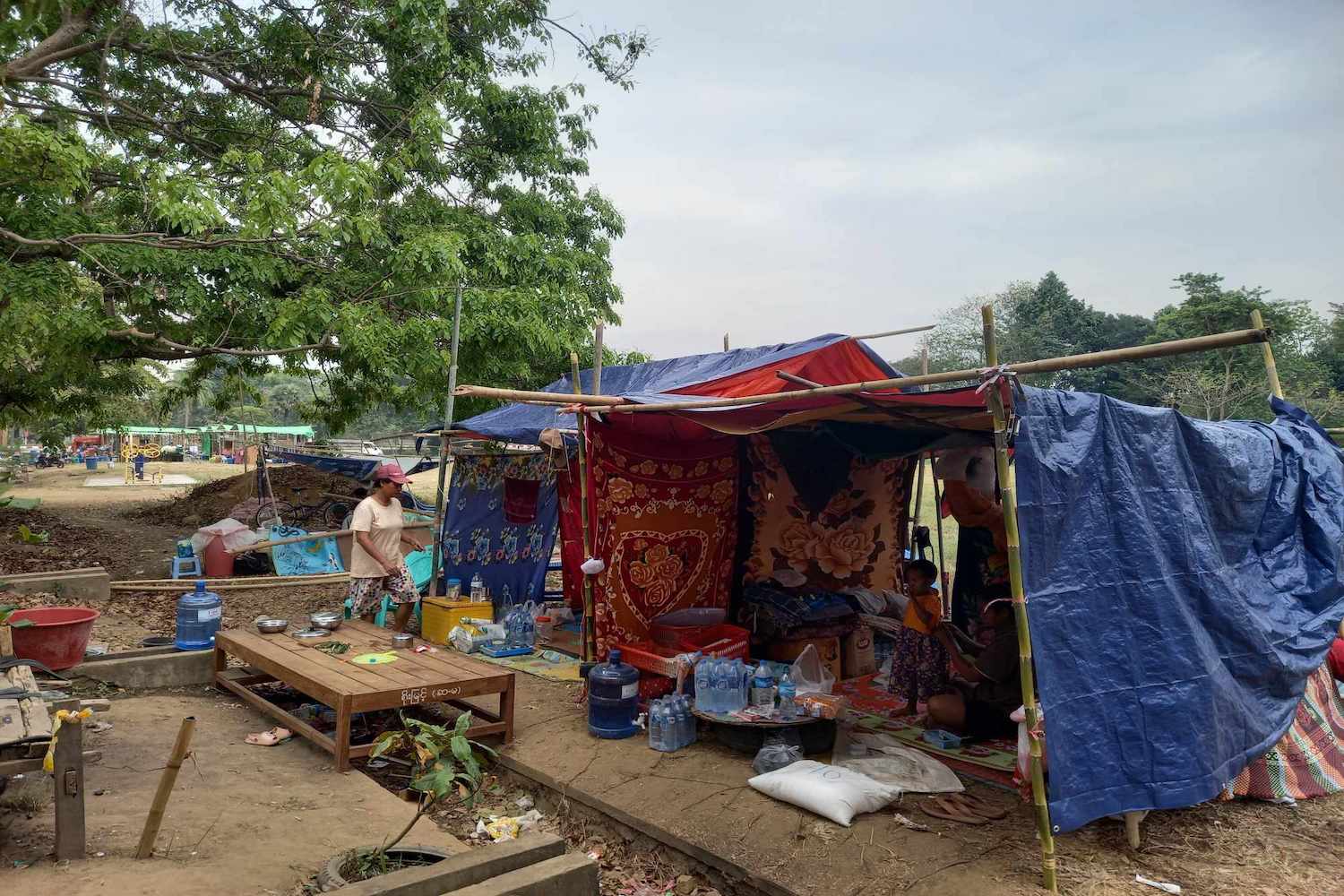The teak trees of the Bago Yoma mountain range have long been a target for illegal logging, but the practice has intensified amid the post-coup chaos, with the involvement of both junta and resistance forces.
By ANT PWEH AUNG | FRONTIER
On his daily trips from his home to the land he farms, Ko Phoe Lone often sees trucks coming down from the Bago Yoma loaded with teak logs.
Most residents of his village in Bago Region’s Yedashe Township, in the mountain range’s eastern foothills, earn their living farming paddy, corn and sesame.
But in March and April, before the monsoon planting season starts, some of them supplement their incomes by using their ox carts to carry felled trees to collection points, where they’re loaded onto trucks for transport to Yangon or the Mon State capital of Mawlamyine. The farmers are paid to carry the logs by brokers who act as middlemen between illegal loggers and timber traders.
Phoe Lone, 30, who asked that his real name not be used, told Frontier he’s deeply dismayed every time he sees the “precious trees” being taken from the mountains.
“It’s the worst it’s ever been,” he said. “If the uncontrolled and reckless logging continues, I’m afraid the Bago Yoma will be completely deforested.”
While the problem has plagued the Bago Yoma for centuries, it has become more rampant since the military coup in February 2021.
The mountains are now contested by a patchwork of armed forces, including regime troops and about a dozen People’s Defence Force battalions operating under the National Unity Government, a parallel administration appointed by elected lawmakers deposed in the coup. With law enforcement largely absent in the region, both sides seem to be involved in plundering and profiting from the forest’s resources.
Hindering ‘the success of the revolution’
In May 2016, the National League for Democracy government imposed a one-year moratorium on logging throughout Myanmar. The suspension was extended to 10 years in the Bago Yoma, because the range was particularly hard hit by deforestation, with an expiration date of 2026.
However, in January 2019 the Japan-based International Tropical Timber Organization reported that “despite the efforts of the government to protect forest resources and ensure sustainable harvesting it has been reported that illegal logging is still rampant in the country even in the Bago Mountain Range”.
According to the report, the Forest Department at the time “admitted it does not have the capacity to tackle the widespread illegal activities”.
The already grim situation was made worse after the 2021 military takeover, according to a spokesperson of the NUG’s Ministry of Natural Resources and Environmental Conservation. “After the coup, the junta increased logging activities, and due to the corruption and exploitation by military personnel at all levels, illegal logging has significantly increased,” he said.
“The Bago Yoma is an area where the NUG is still struggling to establish control,” he added. “The theft of natural resources is a natural result of this instability.”
Several resistance fighters and residents of Bago Region’s Yedashe, Taungoo, Bago and Thayawady townships who spoke with Frontier all said they’ve seen an increase in the number of trucks transporting logs from the Bago Yoma since 2022.
They said some PDFs are directly involved in the logging, while others are turning a blind eye in exchange for payment from timber traders. While some PDF leaders might be seeking personal gain, they said, others are raising money to buy food, weapons, ammunition and other supplies for resistance fighters.
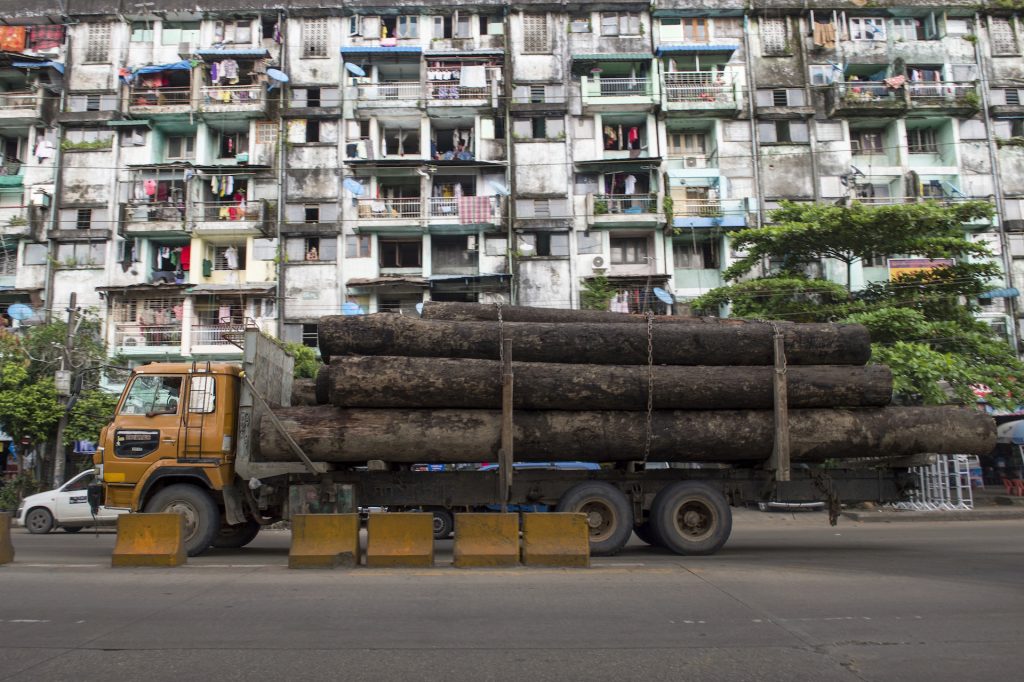
Ko Aung Htet, a member of the NUG-aligned People’s Defence Force-Yedashe who spoke under a pseudonym, said that despite providing a stream of badly needed revenue, the involvement of resistance groups in illegal logging was ultimately counterproductive in the fight against the regime.
“Instead of focusing on attacking the military junta, these groups are concentrating on illegal logging, which could hinder the success of the revolution,” he said.
Ko Lu Aye, a member of the NLD’s Information and Public Relations Team in Bago Region, said timber traders with close ties to the military regime persuade resistance forces to help facilitate illegal logging in the Bago Yoma.
“All of these traders are affiliated with the junta’s Myanma Timber Enterprise. They’re making money by purchasing logs from the PDF groups at a low price and reselling them,” he said. “At first, the PDF groups were only asking for gate fees from timber traders, but now they’re directly engaging in logging for their own profit.”
Profiting from gate fees
In Taungoo Township, five main roads are used by trucks to transport timber out of the Bago Yoma, while in Yedashe Township three roads are used for the same purpose. Each of these roads is controlled by a gate operated by either revolutionary forces or the junta. Timber traders are required to pay a fee at each gate to allow log-laden trucks to pass.
The resistance fighters and locals who spoke with Frontier said timber trucks carrying around five tonnes of timber are charged K600,000 per trip at PDF-controlled gates. Trucks carrying over five tonnes of timber that has been cut into planks at makeshift sawmills in the mountains are charged about K1.2 million.
The junta checkpoints, meanwhile, charge about K300,000 per truck for logs that have been sawed into lumber, and K150,000 for unsawed logs regardless of weight. For smaller transportation methods like bullocks or motorcycles, the PDFs charge about K15,000 per trip, while the junta collects around K7,500.
Another timber trader from Yedashe Township said that in addition to the gate tolls, “We often encounter other revolutionary forces [at random points along the way] that demand donations for the revolution. To ensure safe passage, we have to make payments to those groups too.”
The price of a single unsawed teak log ranges from about K500,000 to K3.5 million depending on the quality. Most of the trees being felled now are at the lower end of the range because the bigger, older trees are already gone. The logs are typically about 18 to 20 feet long.
The price for sawed logs is around K8 million per tonne. A timber truck can usually carry about five tonnes, or about K40 million, of sawed teak logs. Subtracting operating costs, a truck carrying a full load can bring a profit of about K7.5 million.
According to a timber trader from Yedashe Township who requested anonymity for security reasons, most of the logs from the Bago Yoma are trucked to Yangon or Mawlamyine. The teak logs are put up for auction in Yangon, while sales for other hardwood species are “more geographically dispersed” according to a report published in March this year by United States-based advocacy group Forest Trends. The report added that “the MTE has ceased reporting auction results, including sale prices and buyer identities, marking a departure from previous transparency practices”.
Taungoo District Battalion 3501 Company 6, a PDF unit operating under the NUG, announced on February 23 this year that they were responsible for overseeing timber operations in the Taungoo area. They claimed that the NUG’s Ministry of Natural Resources and Environmental Conservation had granted them this authority.
However, the spokesperson of the NUG’s environmental ministry said the claim was not true and denied allowing “any individual or organisation official permission” to engage in logging. “We believe there may have been misunderstandings or misinterpretations of terms by the PDF battalions and soldiers involved in this matter,” he said.
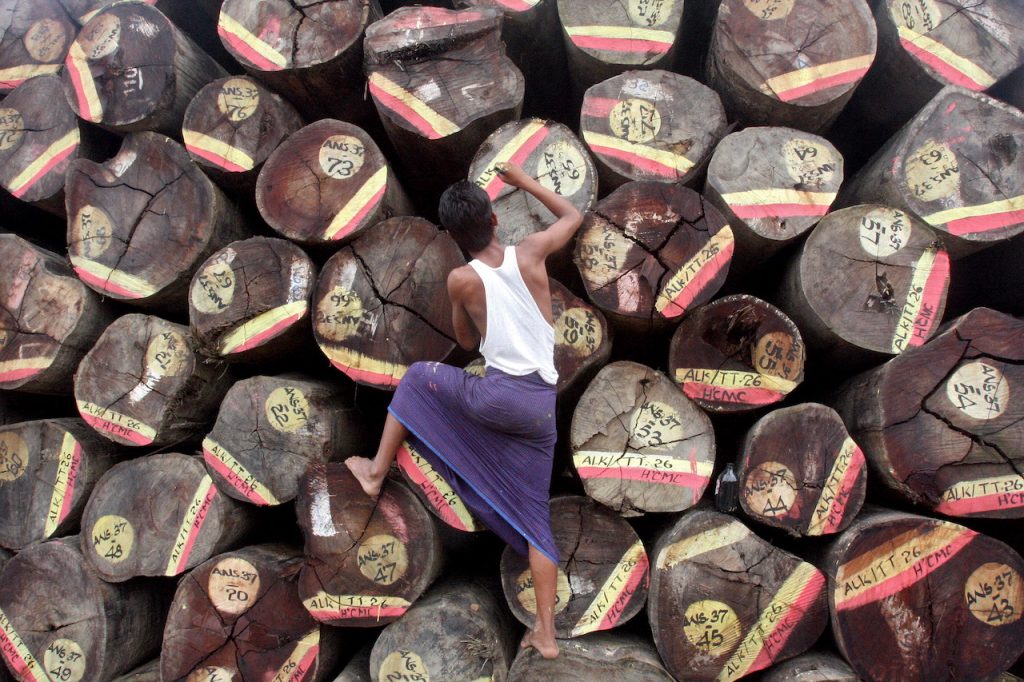
Other efforts to control illegal logging seem to have gone terribly awry. The battalion commander of the NUG’s Thayawady District Battalion 3801, Major Moe Kyoe Gyi, has been accused of killing five civilians last year and then killing Yangon Western District People’s Defence Organisation leader Ko Paing in February, as well as taking 18 other members of Ko Paing’s group prisoner.
Battalion 3801 released a statement in February making unverified claims that the people they had killed and detained were involved in illegal logging, and had also been extracting bribes from locals and leaking information about routes used by PDFs to transport weapons. The sub-regional commander of NUG Military Region 2, U Tin Oo, said the death of Ko Paing was under investigation.
Frontier tried contacting Moe Kyoe Gyi for comment, but received no response.
Despite repeated pledges by the NUG to investigate alleged abuses and unlawful activity by individual PDFs, it has a weak record of holding them to account. PDF-Yedashe fighter Aung Htet said, “Even though illegal logging trucks are operating in the mountains, the NUG has not taken action against them. Some of these groups are now even building sawmills and continuing illegal logging on their own.”
An uphill struggle
Nonetheless, the parallel government has claimed some success in curbing the industry.
The spokesperson of the environmental ministry said that since the coup, the NUG has seized 17,021 tonnes of sawed teak logs, 1,552 tonnes of unsawed teak, 9,342 tonnes of sawed hardwood logs and 9,357 tonnes of unsawed hardwood in the Bago Yoma.
“Action is being taken based on the prescribed methods, such as arresting loggers, punishing them with fines and releasing them after they pledge to stop their activities,” said the spokesperson, adding the ministry has issued “guidelines” for the management of natural resources in areas under its control.
However, sources on the ground describe a situation that is largely out of control.
A spokesperson from Thayawady District Battalion 3802 said while the six companies under their command are not involved in illegal logging, they have had only limited success in preventing timber merchants from engaging in the practice.
This is not always for want of trying. One of the six companies, Underground Guerrilla Forces-Okpo, says it began combating illegal logging in October 2022. Since then, it has apprehended 16 illegal loggers and seized 86 logs.
The group’s leader Ko Day Wa told Frontier that when they do manage to catch illegal loggers, they confiscate the timber but return any cattle, buffalo or vehicles they were using to transport logs.
“Because it’s hard for them to make a living, we don’t detain individuals caught for illegal logging or take their transport, but we do educate them about the harm caused by the logging before releasing them,” Day Wa said.
That education includes teaching illegal loggers that widespread deforestation can increase the risks of natural disasters, including severe flash flooding similar to what occurred in large swathes of Myanmar in September last year as the result of Typhoon Yagi.
They also inform detainees that logging could help the military gain a stronger foothold in the mountains.
“Resistance groups involved in illegal logging are clearing roads in the Bago Yoma to transport the timber,” Aung Htet said. “This puts resistance fighters at risk if the military uses those roads to advance into the mountains in full force.”


